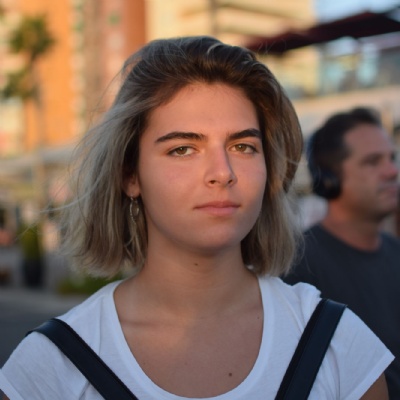
and belonging to a place
Jana rushed in to meet me -- our spot was in front of the St. Clement statue in Ohrid’s square -- about 15 minutes after she passed the first part of her driving test. She was late to it. She works as a waitress over the summer and had spent an hour after her evening shift trying to clean her work shirt, which was stained with orange juice. (She would’ve also been interested in being a cook -- more on that later.) When her driving instructor noticed she’s not at the test site, he called Jana’s uncle, who called Jana’s mom (his sister), who called Jana -- who was, obviously, fast asleep. So, her mom called the next-door neighbor, a friendly woman who banged on the door until Jana woke up. It takes a village, right?
Jana’s proverbial village is the city of Ohrid -- a lake town rich with history and a UNESCO World Heritage Site -- and she knows the place inside and out. In our 45-minute walk, she stopped to say hi to at least seven people, and she joked that’s because she’s been part of every sports team in a 10-mile radius. Sports weren’t enough: she’s a guitarist, a cook who makes the (self-proclaimed) best pancakes in Ohrid, a movie-maker who aptly titled her masterpiece “another female-directed movie not nominated for an Оscar”, and -- in case you doubted her Ohrid cred -- has taken fishing classes. She knows Ohrid so well that, at this point, she’s resorted to biking around the entire lake just to find a new angle to see the city from.
Of course, when you get to really understand a city as Jana has, you also notice some of its downsides. Some are more lighthearted -- she joked that none of the Original Ohrid Pearls are actually original, but every resident gets paid a commission to play along with the prank. Others are more fundamental -- Ohrid has a bad case of brain drain, and even Jana’s brother now lives and works in Skopje, only returning on occasional summer weekends to soak in the lake’s serenity. Those who stay end up having a tough time -- both the local economy and the city’s natural heritage are at risk.
Jana hasn’t decided how exactly she’ll fix these problems yet, but a few ideas have crossed her mind. She’s considered medicine, but her education in UWC Waterford Kamhlaba only starts in January because the College is in the Southern Hemisphere, so she’ll be 20 by the time she graduates and much older by the time she becomes a doctor. She’s also considered engineering -- perhaps something to do with architecture, similar to her older brother. But I was most captivated by Jana’s idea to enter the culinary world. She thinks new restaurants popping up in Ohrid often fail to present the city’s authenticity. Instead, she proposes talking to local grandmas -- relying on her community and her interest in cooking -- to make a truly Ohrid kind of restaurant with a local cookbook. Maybe she’ll even supplement it with some of the cuisine she experiences in eSwatini, too.
Since she has an entire semester until her UWC experience begins, Jana hasn’t had to pick subjects or meet her future peers. I think that’s fine; she’ll have plenty of time to dive head-first into the UWC bubble come winter. Until then, she has the opportunity to finally see Ohrid in a new light -- knowing she’s about to leave, but determined to return.
Bobo Stankovikj, July 2021
